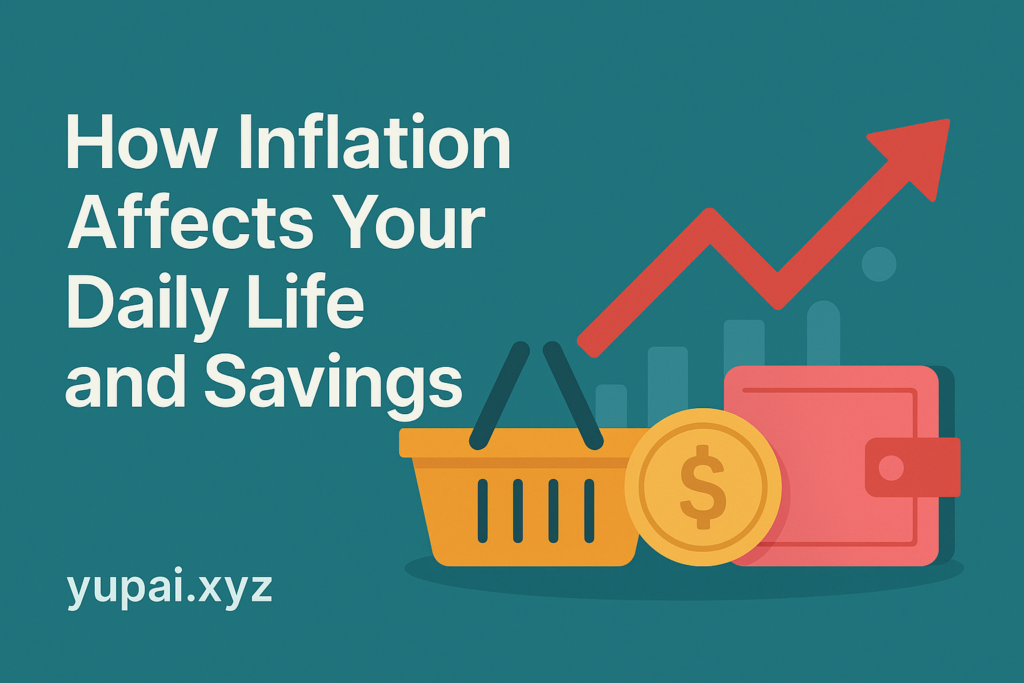Inflation — it’s a word you hear often on the news, especially when prices go up. But how exactly does it affect your everyday life, and more importantly, your savings?
Let’s dive deep and understand how inflation silently eats away at your purchasing power, and what you can do to fight back.

🧐 What Is Inflation?
Inflation is the rate at which the general level of prices for goods and services rises, causing your money to buy less than it did before.
For example, if a cup of tea cost $1 last year and $1.05 this year, inflation is at 5%. That means the value of your money has decreased — you now need more money to buy the same thing.
🛒 How Inflation Affects Your Daily Life
1. Groceries Get More Expensive
You might have noticed that your monthly grocery bill has gone up — even if you’re buying the same items. That’s inflation at work. Bread, milk, vegetables, meat — all slowly creep up in price.
2. Fuel and Transportation Costs Rise
Higher oil prices mean gas costs more. If you commute daily or use delivery services, you’ll feel the pinch.
3. Rent and Housing Become Costlier
Rent increases are common in high-inflation periods. Even property prices go up, making it harder for new buyers to enter the market.
4. Utilities and Bills Increase
Electricity, internet, phone services — most providers raise prices during inflation. That “small” increase in your bill adds up over months.
5. Lifestyle Gets Compressed
Dining out, streaming services, vacations — these luxuries feel more expensive when inflation shrinks your discretionary income.
💸 How Inflation Affects Your Savings
1. Your Money Loses Value Over Time
If you saved $10,000 in a box five years ago, that money can buy less today due to inflation. What you could afford in 2020 is now more expensive in 2025.
2. Low-Interest Savings Lose Against Inflation
If your bank offers 3% interest but inflation is 6%, you’re technically losing 3% in purchasing power each year.
3. Fixed-Income Investments Suffer
Bonds and fixed deposits may seem safe, but during inflation, their returns often don’t keep up with rising prices, eroding your real returns.
🔧 How to Protect Yourself from Inflation
✅ 1. Invest, Don’t Just Save
Invest in assets that outpace inflation — like stocks, mutual funds, real estate, or even certain cryptocurrencies (with risk in mind).
✅ 2. Diversify Your Portfolio
Spread your investments across different asset classes to minimize risk and maximize inflation-beating potential.
✅ 3. Buy Assets That Appreciate
Gold, real estate, and index funds historically perform well during inflationary periods.
✅ 4. Increase Your Income
Upskill, freelance, start a side hustle — earning more is one of the best ways to stay ahead of rising costs.
✅ 5. Cut Wasteful Expenses
Track your spending and cut out what doesn’t serve your goals. Inflation hits harder when money is leaking from small, unnoticed areas.
📊 Real-World Example
Let’s say you had $1,000 in 2013. Here’s how much you’d need now to have the same buying power, assuming 3% average annual inflation:
- In 2023: You’d need $1,344
- That’s a 34.4% decrease in your money’s value over a decade!
🧠 Final Thoughts
Inflation isn’t just an economic term — it’s a daily reality. Whether you’re shopping for groceries, saving for a home, or planning your retirement, inflation affects your choices.
The key is to understand it, plan for it, and protect yourself by making smart financial moves.
Inflation doesn’t have to make you poor — but ignoring it might.